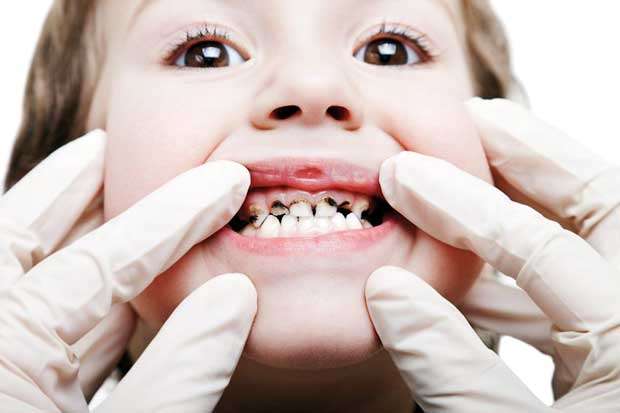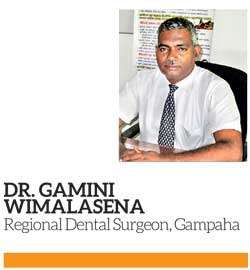11 May 2018 - {{hitsCtrl.values.hits}}

 The failure to pay adequate attention to the care of a child’s primary teeth, more commonly known as milk teeth, is a common occurrence. Most of the time it happens due to the assumption of the parents that since milk teeth remain in the mouth for only a few years of the child’ s life and are replaced with permanent teeth later, they do not require much care. This is a common misconception since milk teeth play a very important part in the child’s development process and therefore demand proper care. We decided to consult Dr. Gamini Wimalasena, Regional Dental Surgeon, Gampaha, to obtain information on the importance of milk teeth, and about the condition called ‘Baby Bottle Tooth Decay’ which affects milk teeth.
The failure to pay adequate attention to the care of a child’s primary teeth, more commonly known as milk teeth, is a common occurrence. Most of the time it happens due to the assumption of the parents that since milk teeth remain in the mouth for only a few years of the child’ s life and are replaced with permanent teeth later, they do not require much care. This is a common misconception since milk teeth play a very important part in the child’s development process and therefore demand proper care. We decided to consult Dr. Gamini Wimalasena, Regional Dental Surgeon, Gampaha, to obtain information on the importance of milk teeth, and about the condition called ‘Baby Bottle Tooth Decay’ which affects milk teeth.
Importance of milk teeth
Milk teeth plays a big role in the growth and development of a child. Not only do they aid a child in the chewing process, speaking and when smiling, milk teeth act as a pathway for permanent teeth to develop later, explained Dr. Wimalasena. Primary teeth save space in the jaw for the permanent teeth, until they are ready to develop. Therefore, the health of your child’s primary teeth would decide how his permanent teeth are going to take shape.

“We have seen children with only the root of the primary teeth remaining due to decaying. Not only are they exposed to an increased risk of developing permanent crooked teeth, they are more likely to experience a loss or decay in their teeth in early life,” states Dr. Wimalasena.
Baby Bottle Tooth Decay
Baby Bottle Tooth Decay, also known as early childhood caries and feeding bottle syndrome, is the decaying of the teeth of a baby since their first appearance in the mouth. This syndrome is present in some kids until around five to six years of age. This is the period when the existed teeth start to be replaced by permanent teeth. The upper front teeth are the most susceptible, but other teeth can also be affected, explained the doctor.
How it happens
The condition occurs largely due to artificial sugars staying in the surface of the teeth. This environment provides a good medium for certain bacteria to grow on the teeth. These bacteria breaks down sugar into acids which results in damaging and decaying of the structure of the enamel. Since milk teeth have a very thin enamel and a more delicate structure when compared to the permanent teeth, they are more likely to develop caries, Dr. Wimalasena further said.
Prevention
As the name itself implies, bottle feeding could be a major contributory factor for tooth decay. Therefore it’s crucial to discourage formula feeding for an infant and opt for exclusive breast feeding for six months.
This process must be followed by breast feeding with complementary food for around two years. The doctor advises the use of a spoon in place of a teat, when giving food. Establishing the habit of brushing their teeth at least twice daily from a young age would help towards the prevention of caries, not only during early childhood, but later in life as well, stated Dr. Wimalasena.
This should be done under adult supervision, making sure that the child does not swallow the toothpaste while brushing, he continued.
Taking calcium rich food and brushing the teeth with a fluoride containing toothpaste will also aid in maintaining continuous health of the teeth, added the doctor.
Treatment
Treatment method will depend upon the severity of the decay, stated Dr. Wimalasena. If the caries are not extensive, the gap can be closed using dental fillers. This will be carried out by a School Dental Therapist or a Dental Surgeon. Counseling of a child exposed to high risk and his or her parents will also be done. If the tooth has suffered extensive damage, it may need removal. A space maintainer is applied to the gap left after removing the tooth to guide the permanent tooth in the correct pathway, he explained.
Message to readers
Dr. Wimalasena has several important messages for our readers. Bacteria like lactobacillus and streptococcus, which are the root cause of tooth decay, enter the mouth of a baby through the tiny particles of saliva ejected from the mouths of people who have close contact with him. Therefore, maintaining good oral hygiene in parents as well as other close contacts of the baby like grandparents, is important in maintaining oral hygiene, stated the doctor. In our country the antenatal clinic package for pregnant mothers includes a dental appointment as well. So it’s important to make use of this visit to ensure the oral hygiene of the mother, even before the baby arrives, he further explained.
Taking the child for school dental visits at least 6 monthly during early childhood would also help maintain their oral health.
The importance of the use of a fluoride containing toothpaste cannot be stressed enough, he said while explaining that using fluoridated toothpaste, even in areas where water has a high fluoride content, will have a local effect on the teeth, protecting them.
Using proper techniques when brushing teeth, ensuring personal hygiene and taking nutritious food which has minimal artificial sugar, will be beneficial in the long run in preserving your child’s smile, he concluded.
22 Dec 2024 9 hours ago
22 Dec 2024 9 hours ago
22 Dec 2024 22 Dec 2024
22 Dec 2024 22 Dec 2024
22 Dec 2024 22 Dec 2024